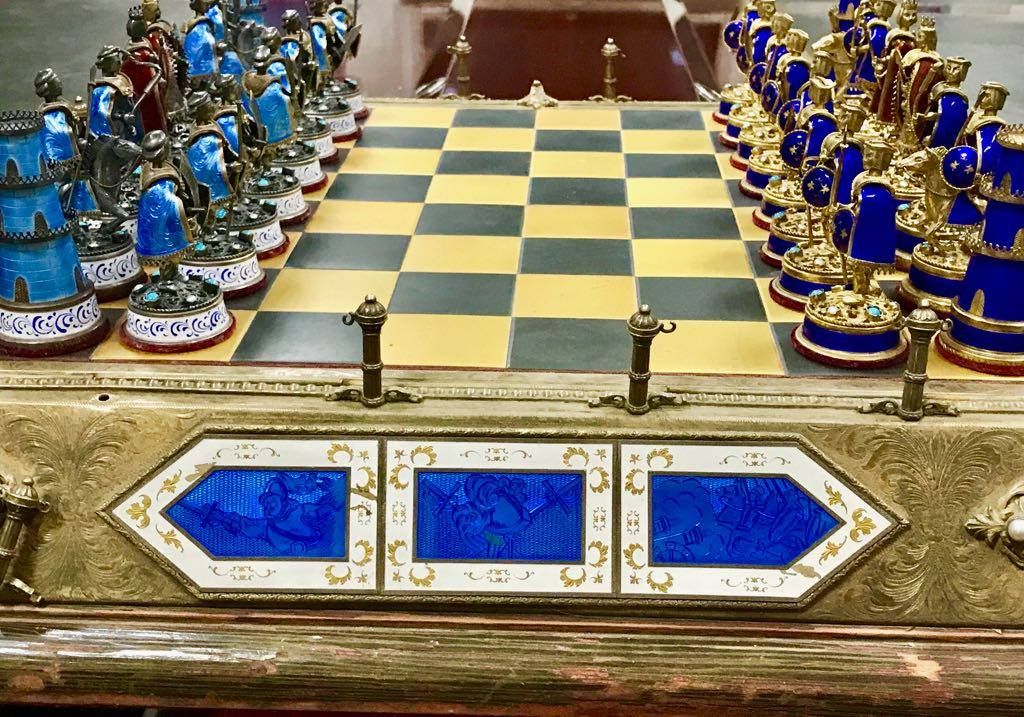
The U.S. government has returned an antique chess set which once belonged to former Iraqi dictator Saddam Hussein, and was stolen during the 2003 invasion of the Iraq.
The United States Embassy in Iraq shared the news on social media, saying the chess set had been returned to Iraqi officials in Baghdad Saturday.
Read more: Isis makes up to $100 million a year smuggling ancient artifacts from Iraq and Syria
"A stolen Iraqi artifact was returned to the Government of Iraq, yesterday. U.S. Embassy [officials] met with the Deputy Minister of Culture for Antiquities and Heritage Affairs Qais Rasheed to return an antique chess set, owned by Saddam Hussein, stolen in 2003 and recovered by the FBI," a statement from the U.S. mission in Iraq read.
"The U.S. is committed to helping return stolen Iraqi artifacts," it added.
The embassy shared a number of pictures of the chess set, and while the FBI has confirmed the antique was stolen in 2003, the circumstances surrounding the theft, and how the U.S came to be in possession of the artefact, are unclear.
Hussein was a known chess enthusiast. According to the Observer, the former Iraqi leader had hoped to hold the 1996 World Chess Federation championships in Baghdad and was described by the chess-loving president of the Russian republic of Kalmykia, Kirsan Ilyumzhinov, as a man who supported chess and understood its value.
Hussein was captured by U.S. forces on December 13 2003 in a military operation in the town of ad-Dawr near Tikrit, his home town. The capture came nine months after the toppling of Hussein and his Baath party. The Iraqi strongman was executed three years later for crimes against humanity.
In 2003, in the wake of the invasion, the International Council of Museums issued an emergency warning on the smuggling of artifacts out of the country. In the first year of the invasion, the Iraqi Museum in Baghdad was looted, with thousands of antiquities stolen. Over a period of between 36-48 hours, over 13,000 objects were stolen from the national museum.
After U.S. forces handed over Saddam's palaces to Iraqi officials, media reports at the time described everything as being stolen apart from the walls, allegedly by Iraqi security officials and locals.
Years after the invasion, auction houses in the U.S. have reported a rise in Saddam-era artifacts being sold, with swords and other items turning up for sale. They have been traced back to U.S. government employees and contractors who took them as souvenirs or war trophies, the Tribune Wire reported.
In the tumultuous years since the invasion of Iraq, the smuggling of the country's ancient artifacts abroad has become a multimillion dollar industry. The Islamic State militant group (ISIS) makes as much as $100 million annually by trafficking looted antiquities out of Iraq and Syria and selling them on the black market.
In July, Oklahoma City-based retail company Hobby Lobby was fined $3 million over its illegal purchase of artifacts believed to have been stolen in 2010 and smuggled from Iraq. "In December 2010, Hobby Lobby executed an agreement to purchase over 5,500 artifacts, comprised of cuneiform tablets and bricks, clay bullae and cylinder seals, for $1.6 million," the Department of Justice said in a statement at the time. "The acquisition of the artifacts was fraught with red flags."
Uncommon Knowledge
Newsweek is committed to challenging conventional wisdom and finding connections in the search for common ground.
Newsweek is committed to challenging conventional wisdom and finding connections in the search for common ground.
About the writer
Callum Paton is a staff writer at Newsweek specializing in North Africa and the Middle East. He has worked freelance ... Read more
To read how Newsweek uses AI as a newsroom tool, Click here.








